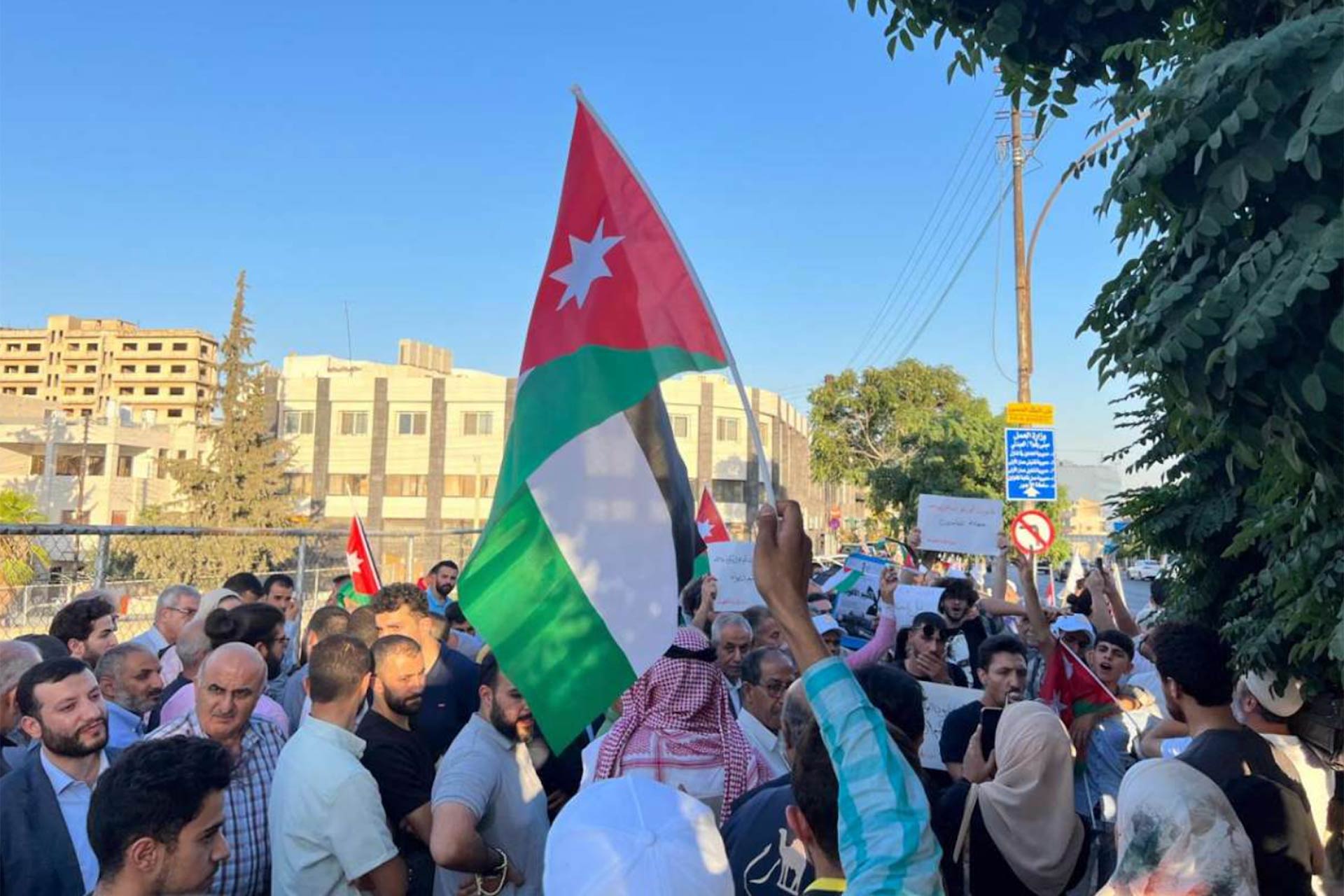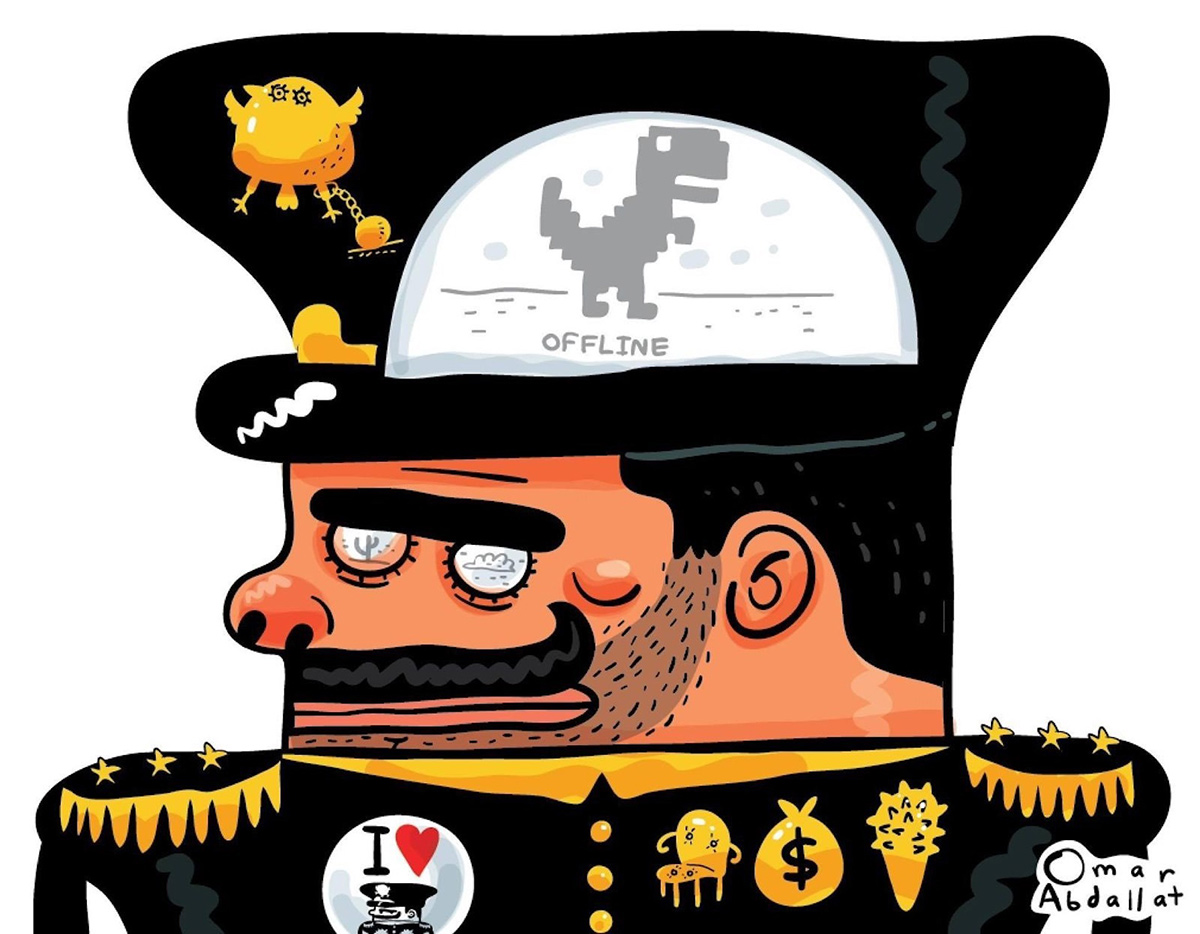The Jordanian parliament is discussing a draconian draft law on Thursday, which will deal a severe blow to free speech in the country.
Opinion: Jordan Calls Time on Free Speech
Published: 27 July 2023

Demonstrations in Amman against the new bill. (photo: jo24.net)
By Rana Sabbagh
If passed, the bill could discourage Jordanians from commenting on sensitive public issues on social media — the last remaining platforms for free speech in a shrinking civic space.
The proposal, which may undergo cosmetic changes, reflects the regional crackdown on free speech and independent media that followed the abortive Arab Spring.
The Jordan Open Source Association, an NGO defending the rights of technology users in Jordan, has demanded the withdrawal of the draft bill and pointed out several problematic articles.
For instance, the bill allows the public prosecutor to block a social media platform countrywide even without a court order.
Authorities have already applied this provision even without the law. In December, TikTok was temporarily banned after users live-streamed a truck drivers’ protest. Seven months later, TikTok is still unavailable.
 Caricature by Jordanian-British cartoonist Omar A. Abdallat.
Caricature by Jordanian-British cartoonist Omar A. Abdallat.
The draft bill also empowers the government to limit up to 75 percent of the traffic to social media platforms that refuse to open a physical office in Jordan, effectively making them almost inaccessible.
The government can ban advertising on such platforms like Facebook for 60 days. Website administrators and people managing apps and pages or channels on social media will be held criminally liable for content posted by others, according to the proposal.
The NGO also criticized the draft bill's open-ended language, such as "character assassination, mocking religions, spreading fake news, and misinformation."
Penalties for breaking the law could include prison sentences of up to three years and fines that on average range from US$28,000 to $58,000 but can go up to $100,000.
Experts also find problematic provisions that enable the state to file complaints on behalf of public officials and entities in cases where they are potentially defamed, whereas ordinary individuals have to do it themselves.
The draft has already sparked outrage among international human rights groups and garnered strong concern from the United States, Jordan's closest western ally.
“This type of law, with vague definitions and concepts, could undermine Jordan’s homegrown economic and political reform efforts and further shrink the civic space that journalists, bloggers, and other members of civil society operate in Jordan,” said State Department spokesman Vedant Patel, who warned that the proposed bill was limiting freedom of expression both online and offline.
According to Reporters Without Borders World Press Freedom Index 2023, for the 11th year running, the Middle East and North Africa remains the world’s worst region in terms of media freedom. No country in the region meets even a "satisfactory" score.
The text of the bill has been coordinated with other Arab states in an effort led by Jordan to boost their leverage with powerful international internet platforms such as Facebook and Twitter, and force them to remove critical content and shut down those who post it.
“They are telling us to close down our Facebook pages,” tweeted critical commentator Ahmed Hassan Zubi, who is facing prosecution over comments he made on social media critical of a serving minister.
Last September, Human Rights Watch warned that Jordan had been intensifying prosecution and harassment of political opponents and ordinary citizens, using a string of laws to silence critical voices over the previous four years.
The authorities had been employing vague laws to detain, interrogate, and harass journalists, political activists, members of political parties, and independent trade unions, as well as their family members, the group said.
Scores of activists have been arrested in recent years over comments on social media. According to the local outlet Khaberni, over 17,000 cases related to cybercrime — including social media comments — have been brought to courts between 2019 and the present.
If this bill is adopted, Jordanians could find themselves imprisoned or fined before being found guilty of what the government would consider cybercrime.
 Caricature by Jordanian-British cartoonist Omar A. Abdallat.
Caricature by Jordanian-British cartoonist Omar A. Abdallat.
Former MP Rula Hroub told Jordan News that the "law will usher us into a phase worse than martial law."
Chief Editor of the online news site Jo24.net Basil Okoor, among only a few independent editors operating in the country, told OCCRP that if the law passes, "it will turn Jordan into a big jail with everyone scared to open their mouths."
Despite widespread criticism of the draft law by 15 political parties, independent unions, political activists, and scores of journalists since the draft bill was sent to the Lower House on July 17, the government continues to insist it will respect citizens' constitutional right to free speech.
It claims that the law is needed to protect Jordanians from internet fraud and the sexual abuse of minors. The law's supporters say this is the only way to safeguard freedom of expression from lawlessness online, where anyone can say what they like. They cite numerous examples of insults, vilification, blackmail, and impersonation with little accountability.
Washington's opposition to the bill may be designed to embolden critics in Jordan. But it will also give the government time to think again about some hard realities.
Behind its public warnings, the U.S. may well be telling Amman that any failure to heed the criticism might result in economic penalties that Jordan could ill afford.
Washington is a longtime U.S. strategic partner. U.S. aid to Jordan has tripled over the past 15 years. The country also hosts nearly 3,000 U.S. troops.
In the years ahead, Jordan says it is planning big political, economic, and administrative reforms, led by King Abdullah, with a big media fanfare to usher them in.
They amount to a promise of greater parliamentary democracy, a more representative government and youth and female empowerment.
But in reality, the new draft law is a stab in the back of this promise. It raises more questions than answers about Jordan's direction.
Freedom of speech and independent media are already an illusion in Jordan, manufactured by the new political, economic, and media elite to mask growing poverty, corruption, nepotism, and failing public services. Journalists are already asked to make clear whether they support or oppose the state.
Those who don't get intimidated, harassed, and put under surveillance.
They become enemies of the state.
Many of those who give the right answers are rewarded with ambassadorships and ministerial appointments.
Already, several parliamentarians who are trying to alter the draft law are receiving phone calls from government agencies.
Jordanians, including journalists, will be free to watch all the promised modernization changes from the sidelines but will need to be very careful what they say about them.
Rana Sabbagh is OCCRP’s senior editor for the MENA region.
